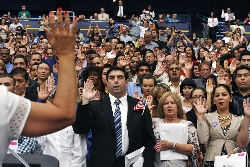BRYCE ON NONPROFITS
- It's not exactly "rocket science" but some people still don't know how to do it.
To use this segment in a Radio broadcast or Podcast, send TIM a request.

Recently I was adding up the number of Board of Directors I have served on over the years for nonprofit organizations. This includes computer societies, fraternal organizations, homeowner associations, even Little League. The number was over 50 where I have served in some capacity or other, everything from president, to vice president, secretary, division director, finance chairman, publicity and public relations, newsletter editor, webmaster, even historian. In other words, I think I've learned a thing or two about nonprofit organizations over the years. One of the first things I learned early on is that unless you manage the nonprofit group, it will manage you.
Running a nonprofit group is not exactly rocket science and is actually pretty simple, but surprisingly few people grasp the basics and end up bungling the organization thereby creating upheaval for its constituents. If you are truly interested in properly managing a nonprofit group, consider these ten principles that have served me well over the years:
1. Know the rules. Get a copy of the governing docs, read them, and keep them with you. Do not try to hide them. In fact, make them available to your constituents either in paper form or as a download on the computer (such as a PDF file). Got a briefcase dedicated to your group? Keep a copy of the docs in it and, if an electronic version is available, place an icon on your desktop to quickly access it.
2. Get to know your constituents. How can you expect to adequately serve them if you do not know what their interests are or the group's priorities as they perceive them? They won't always be correct, but understand their perceptions and deal with them accordingly. You might want to circulate a survey to get their view on certain subjects, and to solicit their support.
3. Communicate - not only with the other members of the board, but with your constituency as well. Failure to do so only raises suspicions about what you are doing. Newsletters, e-mail blasts, and web pages are invaluable in this regard, particularly the latter where you can post news, governing docs, contact information, meeting minutes, audit reports, correspondence, etc. Simple communications will clear up a lot of the problems you will face as an officer on the board.
4. Administer - keep good records, regardless if government regulations require it or not. Whether you are maintaining records with pencil and paper or by computer, it is important that accurate records be maintained, particularly about the group's membership, logs of activities, attendance, finances, minutes, etc. It is not really that complicated to perform; you just need someone who pays attention to detail. Don't have the manpower to do it yourself? Then hire someone, such as a management company, who can competently keep track of things.
5. Lead - people like to know where they are headed. If you are in charge of the group, articulate your objectives and prepare a plan to get you there. Also, do not try to micromanage everything. Nonprofit groups are primarily volunteer organizations and the last thing they want is Attila the Hun breathing down their necks. Instead, manage from the bottom-up. Delegate responsibility, empower people, and follow-up. Make sure your people know their responsibilities and are properly trained. Other than that, get out of their way and let them get on with their work.
6. Add value to your service. People like to think they are getting their money's worth for paying their dues. In planning your organization's activities, be creative and imaginative, not stale and repetitive. In other words, beware of falling into a rut. Your biggest obstacle will typically be apathy. If your group's mission is to do nothing more than meet periodically, make it fun and interesting, make it so people want to come and participate. Try new subjects, new venues, new menus, etc. Even if you are on a tight budget, try to make things professional and first class. Change with the times and never be afraid of failure. You won't always bat 1.000 but you will certainly hit a few out of the park and score a lot of runs.
7. Keep an eye on finances. As officers of the Board, you have a fiduciary responsibility to maintain the group's finances and report on their status. I cannot stress enough the importance of having a well thought-out and itemized budget. Operating without one is simply irresponsible. And when you have a budget, manage according to it; if you don't have the money allocated, don't spend it. Obviously, you should also have routine finance reports produced (at least on a monthly basis) showing an opening balance, income, expenses, and a closing balance. Most PC based financial packages can easily do this for you. At the end of the year, perform a review of your finances by an independent party, either a compilation as performed by a CPA or a review by an internal committee. Post the results so the constituency can be assured their money has been properly handled.
8. Run an effective meeting. Nobody wants to attend an inconsequential meeting. Whether it is a weekly/monthly board meeting or an annual meeting, run it professionally. Print up an agenda in advance and stick to it. Start and end on time and maintain order. Got a gavel? Do not hesitate to use it judiciously. Maintain civility and decorum. Allow people to have their say but know when issues are getting out of hand or sidetracked. And do yourself a favor, get a copy of "Robert's Rules" and study it (see
http://www.robertsrules.com/)
9. Beware of politics. Like it or not, man is a political animal. Politics in a nonprofit group can get uglier than in the corporate world. Some people go on a power trip even in the most trivial of organizations. Try not to lose sight of the fact that this is a volunteer organization and what the mission of the group is. Keep an eye on rumors and confront backstabbers, there is no room for such shenanigans in a nonprofit group. If you are the president, try to maintain an "open door" policy to communicate with your constituents. It is when you close the door that trouble starts to brew. Also, ask yourself the following, "Who serves who?" Does the board serve its constituents, or do the constituents serve the board? If your answer is the latter, than dissent will naturally follow.
10. Maintain control over your vendors. Try to keep a good relationship with those companies and people who either work for or come in contact with your group, particularly lawyers. Always remember who works for whom. I have seen instances where attorneys have taken over nonprofit groups (at a substantial cost I might add). The role of the lawyer is to only offer advice; he or she doesn't make the decision, you do (the client). One last note on vendors, make sure you maintain a file of all contracts and correspondence with them. Believe me, you're going to need it when it comes time to sever relations with them. Keep a paper trail.
Bottom-line: run your nonprofit group like a business. Come to think of it, it is a business, at least in the eyes of the State who recognizes you as a legal entity (one that can be penalized and sued). There are those who will naively resist this notion, but like it or not, a nonprofit group is a business. Consider this, what happens when the money runs out?
I mentioned earlier that you might want to hire a management company to perform the administrative detail of your group. To me, this is an admission that the Board is either too lazy or incompetent to perform their duties (or they have more money than they know what to do with). Just remember, it's not rocket science.
Keep the Faith!
Note: All trademarks both marked and unmarked belong to their respective companies.
Copyright © 2017 by Tim Bryce. All rights reserved.
NEXT UP: UNDERSTANDING MILLENNIALS - What we read in the news cannot all be true; can it?
Listen to Tim on
WZIG-FM (104.1) in Palm Harbor,FL;
KIT-AM (1280) in Yakima, Washington
"The Morning News" with hosts Dave Ettl & Lance Tormey (weekdays. 6:00-9:00am Pacific). Or tune-in to Tim's channel on
YouTube. Click for
TIM'S LIBRARY OF AUDIO CLIPS.
 It has been awhile since I've talked about airports. In the past, I enjoyed air travel but now look for excuses not to go, thereby avoiding the headaches associated with it. Suffice it to say, I find travel to be more laborious than exciting. I think the novelty wore off when they introduced the security checkpoints back in the early 1980's. Now we have to strip and be subject to cavity searches by people who flunked their proctology exams in a foreign country. You really have to hand it to the terrorists for creating a billion dollar industry and putting the homeless to work as security inspectors.
It has been awhile since I've talked about airports. In the past, I enjoyed air travel but now look for excuses not to go, thereby avoiding the headaches associated with it. Suffice it to say, I find travel to be more laborious than exciting. I think the novelty wore off when they introduced the security checkpoints back in the early 1980's. Now we have to strip and be subject to cavity searches by people who flunked their proctology exams in a foreign country. You really have to hand it to the terrorists for creating a billion dollar industry and putting the homeless to work as security inspectors. Tim Bryce is a writer and the Managing Director of M&JB Investment Company (M&JB) of Palm Harbor, Florida and has over 40 years of experience in the management consulting field. He can be reached at timb001@phmainstreet.com
Tim Bryce is a writer and the Managing Director of M&JB Investment Company (M&JB) of Palm Harbor, Florida and has over 40 years of experience in the management consulting field. He can be reached at timb001@phmainstreet.com Back in the 1960's, teens gravitated to drive-in restaurants with "carhops," who delivered food to your car, sometimes on roller-skates. This all changed with the burger chains, yet young people still showed up for shakes, burgers and fries. When I lived in Chicago, there was a local McDonalds where you went to hang-out and be seen with your friends. It was one of the original McDonalds, complete with the big golden arches out front and the "number served" sign updated regularly. More than anything, it was a social venue which propelled the restaurant.
Back in the 1960's, teens gravitated to drive-in restaurants with "carhops," who delivered food to your car, sometimes on roller-skates. This all changed with the burger chains, yet young people still showed up for shakes, burgers and fries. When I lived in Chicago, there was a local McDonalds where you went to hang-out and be seen with your friends. It was one of the original McDonalds, complete with the big golden arches out front and the "number served" sign updated regularly. More than anything, it was a social venue which propelled the restaurant. It seems whenever the subject of Millennials (aka, "Generation Y"; ages 18-36) comes up, be it in a new poll or study, all I hear about is their irresponsible behavior. There seems to be so much of it, it is hard to swallow, such as in how they vote, unemployment, driving, living at home, etc. There are obviously many level-headed Millennials out there, but evidently an inordinate number of deadbeats as well. Frankly, such discussion makes me worry about the future of our country. As a "Baby Boomer," I have to admit I have trouble understanding them. On the surface, they seem energetic and creative, but I fear there is a dark side.
It seems whenever the subject of Millennials (aka, "Generation Y"; ages 18-36) comes up, be it in a new poll or study, all I hear about is their irresponsible behavior. There seems to be so much of it, it is hard to swallow, such as in how they vote, unemployment, driving, living at home, etc. There are obviously many level-headed Millennials out there, but evidently an inordinate number of deadbeats as well. Frankly, such discussion makes me worry about the future of our country. As a "Baby Boomer," I have to admit I have trouble understanding them. On the surface, they seem energetic and creative, but I fear there is a dark side. Recently I was adding up the number of Board of Directors I have served on over the years for nonprofit organizations. This includes computer societies, fraternal organizations, homeowner associations, even Little League. The number was over 50 where I have served in some capacity or other, everything from president, to vice president, secretary, division director, finance chairman, publicity and public relations, newsletter editor, webmaster, even historian. In other words, I think I've learned a thing or two about nonprofit organizations over the years. One of the first things I learned early on is that unless you manage the nonprofit group, it will manage you.
Recently I was adding up the number of Board of Directors I have served on over the years for nonprofit organizations. This includes computer societies, fraternal organizations, homeowner associations, even Little League. The number was over 50 where I have served in some capacity or other, everything from president, to vice president, secretary, division director, finance chairman, publicity and public relations, newsletter editor, webmaster, even historian. In other words, I think I've learned a thing or two about nonprofit organizations over the years. One of the first things I learned early on is that unless you manage the nonprofit group, it will manage you. The press is howling over President Trump's recent attacks on their professionalism and credibility, even going so far as contending he represents a genuine threat to the first amendment, specifically the freedom of the press. Remarkably, many people perceive this threat as legitimate. It is not. Thanks to our Constitution, there is no way he can do so, but there is nothing in there about how he treats the press, or they towards him.
The press is howling over President Trump's recent attacks on their professionalism and credibility, even going so far as contending he represents a genuine threat to the first amendment, specifically the freedom of the press. Remarkably, many people perceive this threat as legitimate. It is not. Thanks to our Constitution, there is no way he can do so, but there is nothing in there about how he treats the press, or they towards him. Following their loss in the 2016 elections, liberals went into a state of shock, followed by a deep sense of outrage and hate, which has caused them to renew their sense of campaigning to take back the government from the Republicans. To do so, they are getting organized and following the community organizing model as touted by
Following their loss in the 2016 elections, liberals went into a state of shock, followed by a deep sense of outrage and hate, which has caused them to renew their sense of campaigning to take back the government from the Republicans. To do so, they are getting organized and following the community organizing model as touted by  I think we're all pretty much guilty of some form of procrastination during our lives. I know I am. The word itself comes from the Latin word "procrastinatus": pro- (forward) and crastinus (of tomorrow). We try to put something off as long as possible, hoping that it will go away, but it rarely ever does. We avoid it because procrastination means to do something considered painful to us, be it a hard decision or a difficult task. We often use the lame excuse that we don't have time to do something, but the reality is we plain and simply don't want to do it. I don't think anyone actually procrastinates over something they really want to do. So we should look upon procrastination as a sign of how a person really feels about something.
I think we're all pretty much guilty of some form of procrastination during our lives. I know I am. The word itself comes from the Latin word "procrastinatus": pro- (forward) and crastinus (of tomorrow). We try to put something off as long as possible, hoping that it will go away, but it rarely ever does. We avoid it because procrastination means to do something considered painful to us, be it a hard decision or a difficult task. We often use the lame excuse that we don't have time to do something, but the reality is we plain and simply don't want to do it. I don't think anyone actually procrastinates over something they really want to do. So we should look upon procrastination as a sign of how a person really feels about something. Recently I wrote a column on
Recently I wrote a column on  Lately I seem to be receiving more than my fair share of e-mails. Among the spam I get daily, I can always count on some flyers on various management related workshops. Lately I have been studying these flyers more closely. It has been my observation the courses being offered seem to lack substance and tend to rely on facade. They seem to dance around the issues and, instead, offer classes aimed at making students feel good about themselves or how to be more politically correct. Even worse, they tend to offer some crackpot theory of management under the guise of being scientific, thereby trying to make them fashionable.
Lately I seem to be receiving more than my fair share of e-mails. Among the spam I get daily, I can always count on some flyers on various management related workshops. Lately I have been studying these flyers more closely. It has been my observation the courses being offered seem to lack substance and tend to rely on facade. They seem to dance around the issues and, instead, offer classes aimed at making students feel good about themselves or how to be more politically correct. Even worse, they tend to offer some crackpot theory of management under the guise of being scientific, thereby trying to make them fashionable. I have a friend who owns and operates a family style restaurant nearby. It has been around for at least thirty years, maybe longer. I'm sure you have one in your neighborhood as well. Sometimes they are called "diners" or "grilles." My personal favorites are the prefabricated or silver streamliner diners I would frequent up north.
I have a friend who owns and operates a family style restaurant nearby. It has been around for at least thirty years, maybe longer. I'm sure you have one in your neighborhood as well. Sometimes they are called "diners" or "grilles." My personal favorites are the prefabricated or silver streamliner diners I would frequent up north. In the Masonic world, we recently observed "Citizenship Month" here in Florida. Because of this, I was asked to give a talk on the subject for a local Lodge. Drawing upon a couple of my past columns, I assembled the following short talk:
In the Masonic world, we recently observed "Citizenship Month" here in Florida. Because of this, I was asked to give a talk on the subject for a local Lodge. Drawing upon a couple of my past columns, I assembled the following short talk: Over the years I have conducted numerous professional training programs, including: Project Management, Enterprise Engineering, Systems Engineering, Information Resource Management, etc. These courses are either held at the customer's site or our own premises. Unlike a school setting with long semesters, a professional instructor has a limited amount of time to convey his points to the students, usually just a few days at most. This can be a daunting task if you happen to have a "mule" as a student. I use the term "mule" to refer to a person who stubbornly refuses to participate in a course for a variety of reasons, mostly arrogance. Such people ignore the instructor and either sleep during the class, work on something unrelated, or wants to frequently take breaks usually to call someone on the phone or disappear from class settings. "Mules" can have an adverse effect on the class by becoming a distraction, particularly if it is a senior person. Nonetheless, as instructor you are being paid to teach specific lessons to a whole group of people, not just a few.
Over the years I have conducted numerous professional training programs, including: Project Management, Enterprise Engineering, Systems Engineering, Information Resource Management, etc. These courses are either held at the customer's site or our own premises. Unlike a school setting with long semesters, a professional instructor has a limited amount of time to convey his points to the students, usually just a few days at most. This can be a daunting task if you happen to have a "mule" as a student. I use the term "mule" to refer to a person who stubbornly refuses to participate in a course for a variety of reasons, mostly arrogance. Such people ignore the instructor and either sleep during the class, work on something unrelated, or wants to frequently take breaks usually to call someone on the phone or disappear from class settings. "Mules" can have an adverse effect on the class by becoming a distraction, particularly if it is a senior person. Nonetheless, as instructor you are being paid to teach specific lessons to a whole group of people, not just a few.